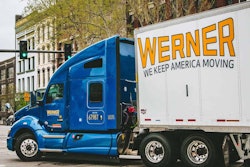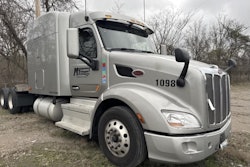TSA DELAYS STATES’ DEADLINE FOR FINGERPRINTING
The day after states were supposed to begin requiring truck drivers seeking hazardous materials endorsements to submit fingerprints for criminal background checks, the Transportation Security Administration postponed the mandate until April 1, 2004. In addition, states that won’t be prepared to begin fingerprinting on that date can obtain an extension by submitting a satisfactory plan to TSA for deploying a fingerprinting process by Dec. 1, 2004. In a related action, the Federal Motor Carrier Safety Administration published an amendment to its regulations to conform to TSA’s change in implementation of the hazmat endorsement background check rule.
The trucking industry had anticipated an extension for several months. TSA received comments from 23 states requesting a delay beyond the Nov. 3 deadline so they could obtain necessary state legislative changes, funding and infrastructure to implement the background checks. The principal concerns were cost of fingerprinting equipment, the time needed to hire and train personnel to operate the fingerprinting equipment and state legislative changes necessary to collect fees and implement the program.
In addition, TSA has determined that a “one size fits all” approach to fingerprint collection and adjudication is impractical, the agency said. Each state has systems in place to license commercial drivers and award hazmat endorsements as well as to collect fingerprints and transmit them to the Attorney General. So TSA has decided to allow varying processes so that states would not have to change existing processes as long as they met TSA standards.
Under the rule TSA is amending, drivers would not be able to obtain or renew hazmat endorsements if they are convicted of or incarcerated for certain disqualifying crimes within a prescribed period of time. The rule also disqualifies drivers with histories of mental illness. Any driver holding a hazmat endorsement who knows that he has committed a disqualifying offense was required to surrender his endorsement as of Sept. 2, 2003, and TSA’s amendment did not alter that deadline. Drivers losing their hazmat endorsements may still use their commercial driver’s licenses to drive in situations where endorsements aren’t required.
For more information, visit http://dms.dot.gov/search and search Docket Nos. 14610 and 11117.
CARGO NOTIFICATION RULES FINALIZED
The Department of Homeland Security (DHS) last month released final rules that will allow U.S. Customs and Border Protection (CBP) to obtain advance electronic manifest information on crossborder shipments so officials can identify high-risk cargo before clearing borders. The rule was expected to be published in the Federal Register by Dec. 5. However, the rule will not be implemented until 90 days after the date CBP officially announces in the Federal Register that an approved data interchange is in place and fully operational. That date is far from clear today.
As originally proposed, the rule requires transmission of a manifest at least one hour before entering and leaving the United States by truck. Truck carriers certified under the Free And Secure Trade (FAST) program, however, can transmit as late as 30 minutes before crossing. (For more on the FAST program, see “On the fast track,” page 42.) Other modes of transportation require electronic notification 2 to 24 hours before arrival in the United States.
The American Trucking Associa-tions pledged to work with DHS and CBP to ensure a successful implementation of the rule, but the organization said it is concerned over how CBP will communicate with motor carriers and drivers once their cargo has been cleared for entry.
“Motor carriers need a ‘go’ or ‘no go’ decision as soon as possible to prevent disruptions in the supply chain and to keep on schedule to satisfy the time-sensitive demands of our just-in-time manufacturing processes,” said ATA President Bill Graves in reaction to the new rule.
Carriers also are urging CBP to ensure that the information technology and electronic notification systems required for freight clearance are realistic and adaptable for small carriers. “While most major motor carriers are up to speed in information technology, over 80 percent of our industry is made up of carriers with five or less trucks – the vast majority of these carriers are likely less-sophisticated in the use of information technology,” Graves said.
For more information, including a summary of the rule, visit www.cbp.gov.
ATA SEEKS NEXT ROAD TEAM
The American Trucking Associations has opened its selection process for the 2005-2006 America’s Road Team. Sponsored by Volvo Trucks, the team is made up of 12 professional truck drivers who possess an outstanding safety record and a demonstrated commitment to educating the general public about highway safety, the contributions trucking makes to the national economy and the American standard of living. Applications will be open until July 31, 2004. For copies of the nomination form, contact Rowenna Martin, America’s Road Team manager, at (703) 838-1962 or [email protected].
BRIEFLY
U.S. House Transportation Committee leaders on Nov. 20 introduced legislation (H.R. 3550) to renew authority for highway safety and development programs, as well as motor carrier safety programs, for six years. The previous authorization expired Sept. 30, and the programs continue under a short-term authorization that expires at the end of February.
Environmental Protection Agency recently released an analysis of refiners’ data projecting that 96 percent of the nearly 3 million barrels of highway diesel produced per day will meet the agency’s new low-sulfur standard by 2006.
Truck and trailer repossessions declined for the third consecutive quarter, reported the Nassau Asset Management’s NasTrac Quarterly Index. The repossession data, when compared with the same quarter a year ago, shows a 12 percent decrease in repossessions.
Con-Way Transportation Services announced – and then withdrew 10 days later – a 2 percent surcharge on net linehaul charges for LTL shipments to help pay for its escalating health insurance costs. Customers said they preferred to pay the expense within a general rate increase.
Volvo named Mack Trucks President and CEO Paul Vikner to Volvo’s Group Executive Committee, effective Jan. 1, 2004. The GEC is the highest-level management committee in the Volvo Group. Vikner will continue to serve as head of Mack.
MERGERS & ACQUISITIONS
Yellow Corp. and Roadway Corp. announced that the Justice Department’s Antitrust Division allowed the Hart-Scott-Rodino waiting period concerning Yellow’s acquisition of Roadway to expire without taking any action to block the transaction. Both companies are scheduled to hold special stockholder meetings Dec. 9, and the deal could close as early as Dec. 11.
Parker Hannifin Corp. has acquired Webb Enterprises from Hunter Manufacturing Co. Webb produces fuel conditioning systems, heating systems and lubrication and monitoring systems for diesel-powered heavy-duty trucks and other equipment.
Comdata Corp. has acquired the assets of Fleet Team Inc., a Delaware-based transaction management software and business systems firm specializing in commercial fleets. Fleet Team will be an operating unit of Comdata’s Merchant Services division. It expands Comdata’s commercial fleet offerings into the retail marketplace and adds the capability of integrating transaction technology and maintenance records on a vehicle-by-vehicle basis.
Market Transport, an asset-based logistics and multimodal transportation services company, acquired InTransit, the 9th largest transportation broker in the United States. The combined company is expected to generate nearly $200 million in revenue in 2003.
CCJ EQUIPMENT DEMAND INDEX
Fleet managers seeking spot loads for dry vans and flatbeds in January could see Ohio as the richest source, according to the latest CCJ Equipment Demand Index. In January 2003, Ohio led all states in spot-market equipment demand, replacing Illinois, which had held the position for the last six months of 2002. Data for the past three years shows Ohio typically holds either first or second place for van demand in January.
Meanwhile, Ohio also continued to dominate flatbed demand for the fifth consecutive month. The state had approximately 36 percent more flatbed equipment searches over second-place Illinois. Historical data shows that Ohio traditionally has strong demand for flatbeds in January, holding first place in 2002 and second place in 2001.
Arizona took the top position for reefer demand, while California dropped to seventh place after holding first place the previous two months. Illinois remained in second place with 43 percent fewer reefer searches. The data shows a jump in reefer demand in Arizona from 2002, when the state moved up from 16th place to first place.
The index, based on equipment searches performed by TransCore customers, shows the top 15 states in terms of demand for trucks in the spot market in the three most common equipment types: dry vans, flatbeds and refrigerated units. The index is intended to help fleet operators identify the most promising opportunities for backhaul and other spot-market freight in the month after its publication.
AIRIQ LANDS ASHLEY DISTRIBUTION
AirIQ Inc. said Arcadia, Wis.-based Ashley Distribution Services Ltd. has selected AirIQ’s products and services in a transaction valued at $1.54 million. The private fleet delivers furniture to stores and warehouses throughout North America using 1200 trailers. AirIQ’s IQ-X interface, which Ashley’s dispatchers use, allows fleet managers to obtain automated alerts from their fleet vehicles, initiate action requests to their fleet vehicles and obtain action responses from their normal operating environment.
CORRECTION
CCJ incorrectly stated the 2002 revenues for CRST in The Top 100 ranking, which was published in the August 2003 issue. The correct revenue figure is $4,67,014,000, which moves CRST’s ranking up three spots to No. 33. Accordingly, the correct rankings for AHC Trucking, Southeastern Freight Lines and C.R. England all drop one position.







